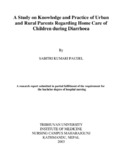Please use this identifier to cite or link to this item:
https://hdl.handle.net/20.500.14356/590| Title: | A study of knowledge and practice of urban and rural parents regarding Home care of Children during Diarrhoea |
| Authors: | Paudel, Sabitri Kumari |
| Issue Date: | 2003 |
| Keywords: | Home care of Children Diarrhoea |
| Abstract: | This comparative, exploratory type of study was adopted to measure the knowledge and practice about care of children under five during diarrhoea between Urban and Rural parents for partial fulfillment of requirement for Bachelor degree in Nursing. The objectives of this Study was to compare the knowledge and practice between Urban and rural parents regarding home care of under 5 children during diarrhea. The area of the study was Medical OPD of Kanti Children Hospital. A combination of closed and semi structured questionnaire was used for the interview of the subject after maintaining validity and reliability. Data was collected by investigator herself and obtained data were analyzed by using statistical tools or formulas. A quota sampling method was used to select the 50 samples. Major findings drawn from the study shows that diarrhoea was predominantly seen in male children both in Urban (68%) and rural (76%) areas. Diarrhoea was seen in age between 6 months to 2 years both in Urban (40%) and in rural (60%) children. Most of the children were suffered from mild dehydration both in (64%) Urban children and (80%) in rural children. Majority of respondents were mother both in Urban (88%) children and rural (88%). And majority of mother were age group between 20-24 years both in Urban and Rural majority of respondents were literate both in Urban (72%) and (80%) in rural. Majority of the respondents in both areas were housewives, 76% in Urban and 84% in rural. Majority of respondents had one child both in Urban and rural. Majority of respondents (52%) in Urban areas had satisfactory economic status but (56%) of rural respondents had poor economic condition. Majority of respondents, 76% in Urban and 60% in rural respondents knew the causes and meaning of diarrhoea. 80%& 80% of respondents in both areas stated that under 5 children are most risk for diarrhoea. 72% of urban respondents stated that diarrhoea is communicable where as 64% of rural respondents stated that diarrohea is not communicable. 52% of rural parents stated that diarrhoea is dangerous disease but 48% of urban parents stated that diarrhoea is both (simple + dangerous) diseases. 76% and 76% of Urban and rural parents stated that diarrhoea is preventable by the proper sanitation, hygiene and by using boiled water. Cent percentage of Urban and rural parents stated that food is better during diarrhoea, among them cent percent parents of Urban and 96% of parents of rural stated that liquid food is better duringt diarrhoea. 68% of rural parents and 60% of urban parents had not knowledge regarding dangerous complication of diarrhoea. 88% of urban respondents stated that Dal Ko Jhol is better during diarrhoea whereas 72% of rural respondents stated that Gedagudi Ko Jhol is better during diarrhoea. 96% of urban respondents and 92% of rural respondents had knowledge regarding jeevanjal. Cent percent of urban respondents and 92% of rural respondents were giving additional water, among them. 80% of urban respondents had given jeevanjal but 56% of rural respondents had given plain water during diarrhoea. 60% of urban respondents and 50% rural respondents were giving fluid correctly. 92% rural respondents and 84% urban respondents were breast-feeding then continuous in diarrhoea. 92% urban parents and 76% rural parents were giving food during diarrhoea, among them cent percent of respondents in Urban and 78.94% of rural respondents were giving Jaulo to their children during diarrhoea. 88% of urban respondents and 84% of rural respondents were disposing his/her child’s diarrhoeal excreta in toilet. Cent percent of Urban and rural parents were cleaning the child’s buttock after each defecation. Cent percent of Urban and rural parents were hand washing after disposing child’s diarrhoeal excreta among them cent percent of urban parents and 92% of rural parents were used soap and water for hand washing. 64% of rural children and 56% of urban children were checked to other before came to the hospital. The conclusion of this study is that the majority of urban and rural parents have adequate knowledge and positive practice about care of children during diarrhoea and also this results indicate that knowledge and practice of rural parents not poor in relation to urban parents. It might have been due to educational status, facilities of communication; transportation and residential area because most of rural parents were from Kathmandu valley than out of valley. This study recommends that the problems of diarrhoea should be controlled and cured by using of adequate oral rehydration solution and others liquids. And this study also recommends that the health education still needed about “danger signs of diarrhoea”because majority of urban and rural parents have not knowledge regarding it. |
| URI: | http://103.69.126.140:8080/handle/20.500.14356/590 |
| Appears in Collections: | Post Graduate Grant (PG) Reports |
Items in DSpace are protected by copyright, with all rights reserved, unless otherwise indicated.

